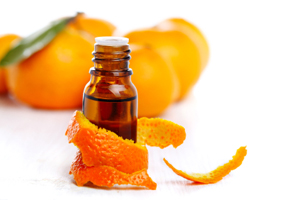
Have you ever wondered what gives cannabis strains like Super Lemon Haze, Chernobyl, and Tangie a sweet citrus aroma? That’s Limonene (D-limonene), a cyclic monoterpene produced in the cannabis flower’s resin glands and most commonly found in highest concentrations in the rinds of citrus fruit. A terpene with a wide range of uses, limonene is a commonly used terpene in perfumes, it is cheap and abundant enough to use as a semi-green degreaser or solvent and in household cleaners, food, and medicines. Terpenes are fragrant oils secreted in trichomes alongside cannabinoids like Tetrahydrocannabinol (THC) and Cannabidiol (CBD). Some strains tend to express higher levels of limonene, and often it’s the sour lemon scent that gives it away. These terpenes not only dictate the smell of cannabis, they can also modify its effects. But what’s so special about it? A major reason for limonene’s widespread use is its very low toxicity. While not being toxic to humans, a study done in the United Kingdom shows that allergic reactions (sensitisation and/or contact dermatitis) to limonene and linalool are more common than previously thought. Limonene may be related to α-pinene.

Limonene has a history in medicine, so it should come as no surprise that the limonene found in cannabis offers therapeutic benefits as well. Some of these studied effects include:

Limonene has a history in medicine, so it should come as no surprise that the limonene found in cannabis offers therapeutic benefits as well. Some of these studied effects include:
- Aiding digestion
- Anti-bacterial properties
- Anti-depression - relieves symptoms of depression, elevates mood. A 2012 study examined limonene’s role as a corticotropin-releasing factor in the brains of rodents and found it to be notable and thus a significant way to treat depression.
- Anti-fungal agent - natural remedy for athlete’s foot or yeast outbreaks
- Anti-inflammatory - a 2010 study examined the anti-inflammatory effects of limonene and found it to be a potential treatment for asthma due to its ability to inhibit cytokines. There has been much study done on limonenes effectiveness in fighting cancer through stimulating apoptosis and other mechanisms. A 2012 study found limonene to have strong enough inhibition of inflammation to actually be chemopreventive, which means it prevents, rolls back, and protects against cancer. A 2013 study went so far as to recommend using limonene as a dietary supplement due to its powerful anti-inflammatory effects on the intestines.
- Anti-proliferative - inhibits cancer cell growth and as such has been identified to help fight the spread of various types of cancer including glioblastoma, prostate, pancreatic, breast and skin.In the case of glioblastoma, a 2010 study found that perillyl alcohol, a constituent of limonene, increased the survival rate of patients and had virtually no long-term side effects. Perillyl alcohol isn’t the only constituent of limonene to fight cancer; it’s been known for two decades that d-limonene exhibits “multiple antitumorigenic effects” After the 1994 study, numerous other studies followed including a Phase I/II clinical trial in 1998, which found d-limonene to be effective at combating advanced cancers and recommended further research. Since they first began being heavily researched in the mid 1990’s, both d-limonene and perillyl alcohol have seen numerous studies and clinical trials demonstrate their abilities to combat cancer time and again. They have been shown effective against numerous types of cancer including breast, prostate, skin, and pancreatic cancers.
- Anxiolytic - a study published in April 2012 edition of Brain Research found that limonene exhibited anxiolytic-like effects so potent and with so mild of side-effects that it was recommended as a 'new' treatment for anxiety.
- Immunostimulant - stimulates the immune system
- Improves absorption of other terpenes and chemicals by way of the skin, mucous membranes and digestive tract
- Prevents gastric distress, relieves heartburn and gastro-oesophageal reflux
- Promoting weight loss
- Stress relief
Whereas THC levels typically make up 10-20% of a flower’s biomass, limonene occurs in mere trace amounts, generally from none at all to 1-2%. Some strains exhibit higher levels of limonene than others, and these levels can vary widely across harvests depending on the growing and curing process. In other words, one grower’s Jack Herer may test for high levels of limonene while another’s demonstrates a disappointing lack thereof. The only way to know for sure is through lab-tested batches. If your choices are not tested, you can always try following your nose or search a database like Leafly's for citrus flavours.
Here's just a sample of limonene-rich cannabis varieties, compliments of Leafly:
Cannabis sativa
 |
| The presence of limonene is in both name and aroma with Super Lemon Haze, a sativa strain known for its ability to lift the spirit alongside a sweet lemon flavour. |
 |
| The limonene in Durban Poison, a high-energy sativa, isn’t immediately apparent in its subtle sweet and earthy aroma, but you’ll feel its uplifting, stress-relieving effects nonetheless. |
 |
| Jack Herer is a fan favourite for a reason: not only does it typically boast high levels of limonene, Jack offers a palette of other terpenes like pinene and myrcene, which promote alertness and relaxation respectively. |
Cannabis indica
 |
| Limonene appears most often in sativa strains, but that doesn’t mean there aren’t indica strains with a high limonene potential. Berry White exemplifies this with a limonene content that can be felt in its happy, stress-less effects. |
Cannabis hybrid
 |
| You know how OG strains tend to have that lemony pine aroma? That’s limonene, and it can also be detected in SFV OG's blissful, stress-crushing sensations. |
Limonene can be vaporised at or around the terpenes boiling point of 176 °C (349 °F).

refined limonene can also be used as a natural solvent to extract cannabinoids from raw cannabis, it is known as LHO
ReplyDeletethe ONLY guy doing it is Horatio Delbert, check out his instagram for more info: instagram.com/hdc_lho
Excellent article.
ReplyDelete